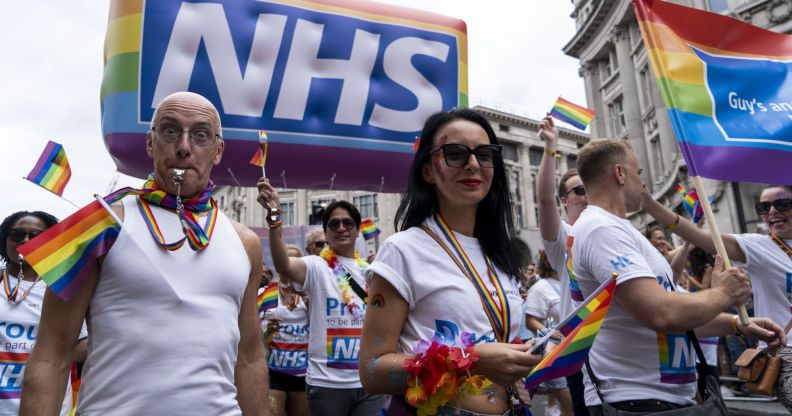Trans people allegedly waiting up to 35 years for first appointment on NHS

An FOI request has uncovered the potentially staggering wait times for trans healthcare on the NHS. (Getty)
A freedom of information (FOI) request has revealed the shocking waiting times faced by trans people seeking medically necessary gender-affirming care with the NHS.
Information uncovered by the request in 2022 was highlighted by trans broadcaster India Willoughby on social media on Thursday (3 August) tweet.
The November 2022 thread alleged that the FOI request suggested a 35-year waiting time for trans people seeking gender-affirming care.
A freedom of information request is an appeal for information made by a member of the public into data held by a public authority.
The FOI request found that, as of 31 October 2022, there were 1865 people on the waiting list for a first appointment at the Porterbrook Gender Identity Clinic (GIC) in Sheffield.
It also found that, on average, the maximum wait time for patients as of October 2022 was 220 weeks for a first appointment, with about 0.2 patients seen per day on average.
Between January and October 2022, 33 patients had been seen for a first initial appointment.
Activist Amber, who sent the FOI request, calculated that, if all the information was accurate, it would take up to 35 years for a new applicant to be seen by Porterbrook GIC.
“The NHS has trans healthcare in name only, any [care] they are providing is just a statistical anomaly, a rounding error,” Amber wrote.
According to Porterbrook’s website, it is currently booking appointments for individuals referred to the service in 2018, adding that the “longest wait time” is 62 months as of July 2023.
NHS wait times for trans healthcare have long been a serious issue for the community, many of who have deemed them “unlawful.”
Trans woman and activist Hannah, who was referred to the GIC in Leeds in 2022, said that she felt as though an appointment was “never going to happen for me.”
She told PinkNews: “There were [approximately] 2,500 trans folk waiting at the time [in 2022] and they told me they were still booking people from January 2019.
“The waiting list has increased and the service has come to a total standstill by the looks.”
Since then, The Newsam Centre in Leeds has estimated the total number of referrals to have jumped to 4259 people as of May 2023 – an alleged 70 per cent increase in the space of 16 months.
Hannah noted that the medicalisation of obtaining a Gender Recognition Certificate (GRC) – a legal document recognising someone’s identified gender – could be having a knock-on effect with the wait times crisis faced in the NHS.
“Self-ID is so important,” she said. “This is why the full medicalisation of obtaining a GRC needs to be removed. If this does not happen, I simply won’t be able to get [an appointment], not in my lifetime.”
NHS wait times deemed lawful by High Court following legal claim
The gap in referrals to first appointments has become so severe that activists took to the High Court to address the wait times.
The Good Law Project, along with trans-led charity Gendered Intelligence and others, filed a legal claim in 2021 accusing NHS England of failing to uphold its legal duty to minimise waiting times.
Dubbed the “We are just people too” case, activists argued that England had become an “international outlier” in trans healthcare with the “extreme” wait times faced by trans people.
One of the adult claimants in the case, Eva Echo, said at the time: “For too long, the NHS has failed to prioritise trans healthcare. We, alongside many affected individuals, medical professionals, families and campaigners for trans rights, believe the current system is not fit for purpose.
“My mental health was worse than it had ever been; coming out had allowed me to recognise my gender dysphoria, but I was left completely alone to manage it.
“I felt, and still feel, completely let down by the system that I thought was there to save me.”
The High Court rejected the legal claim in January 2023 but allowed it to go to the Court of Appeal, which later dismissed it, citing that the commitment was only applicable to “consultant-led services” and is, as a result, not legally binding.
In a statement provided to PinkNews, Sheffield Health and Social Care (SHSC) executive director of operations and transformation, Neil Robertson, said: “We are here to help people who can be going through a difficult time in their life – as an organisation we understand our waiting times are too long for someone to wait.
“We are doing everything to ensure people get a timely response and if someone is on the waiting list we offer help and guidance through our own Peer Support workers. They have lived experience of using our services.
“In addition, we work closely with our partners at Gendered Intelligence. They offer free and confidential advice to anyone waiting to access our service.”
Robertson continued that Porterbrook and SHSC have recruited and trained staff and have made efforts to increase initial assessment since November 2022.
“We publish up-to-date information about our waiting times for people who have been referred to us on our website. The longest waiting time is 62 months – as of July 2023.
“Our Porterbrook clinic is one of seven nationally in England and the issues we face are similar to those experienced elsewhere. We are working hard locally to reduce our waiting lists.”
How did this story make you feel?

